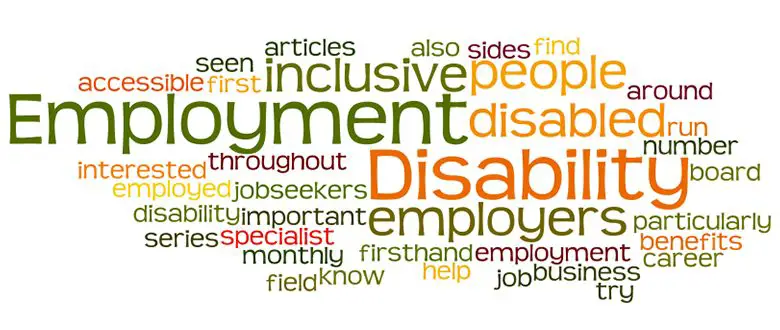
Employment and disability: advantages of being disabled
Jane Hatton, who manages Evenbreak, a not-for-profit job board run by disabled people for disabled people, publishes her monthly article on the subject of employment and diversity.
This month she looks at the additional and very beneficial skills that disabled people acquire, and how you can use them to your advantage.
 Last month we explored why disabled people should be attractive to employers. This month I would like to explore just one area of that a bit further. Like everyone else, as disabled people we all have our own unique range of skills and talents. But nearly always, we have developed additional skills to navigate our way around a world which isn’t designed for us. Often our impairment itself will mean we can do things other people can’t. Here are some examples of what I mean.
Last month we explored why disabled people should be attractive to employers. This month I would like to explore just one area of that a bit further. Like everyone else, as disabled people we all have our own unique range of skills and talents. But nearly always, we have developed additional skills to navigate our way around a world which isn’t designed for us. Often our impairment itself will mean we can do things other people can’t. Here are some examples of what I mean.
Innovation and creativity
Most disabled people face barriers which get in the way of doing things. So we have to be creative in finding other ways round, through or over those barriers. My own impairment (a degenerative spinal condition which prevents me from sitting) means I can’t sit at a desk to use a computer. So I lie down with a laptop suspended above me. A colleague has poor fine motor skills and can’t use a keyboard, so he uses software called Dragon Dictation which means he can dictate to the computer, and it will type what he says. People who can think of innovative solutions to problems are an asset in the workplace.
Persistence and determination
Linked to the above, disabled people tend to work at problems until we find a solution. We don’t give up at the first hurdle, or we would never achieve anything. For example, one of our candidates took four years instead of two years to complete his Business Studies qualification due to a learning disability. Many people would have given up at the first sign of a problem, but he was determined to succeed, and he did. Most employers would value an employee who sticks at things rather than walking away as soon as they face difficulties.
Problem solving
Again, due the barriers we face, disabled people develop problem-solving skills. Things that most people take for granted can be problematic for us – everyday things such as transport, communication, even getting dressed. So we find solutions. This might be an alternative way of doing things (I can’t drive very far or use public transport, so I lie down and am driven to places), or it might be involving others in supporting us. We often see solutions where others see problems.
Assistive technology
Sometimes the reasonable adjustments that we use mean we can be more productive than our non-disabled colleagues. A candidate who uses dictation software (mentioned earlier) is much quicker and much more accurate than his non-disabled colleagues. The software works at the speed he talks, and unlike humans, doesn’t make spelling mistakes or typos!
The impairment itself
Often the impairment itself can be an advantage to the employer. We have employers advertising some jobs on our job board specifically targeted to people on the Autistic Spectrum, because often such people are great at attention to detail, spotting patterns and noticing mistakes. Deaf employees can be productive because they don’t get distracted by the office gossip about what happened in Eastenders last night! People with bi-polar or schizophrenia can be very creative. People working with other disabled people can often be more helpful if they share that condition. So for example, someone giving career advice to a blind person would be more credible and understand the issues better if they were blind themselves.
In a later article we will be exploring how to identify strengths and skills that will be attractive to employers, but it’s easy to forget those extra advantages we bring with us, such as those mentioned here. How does your impairment make you more attractive to employers?
Check out…
• Inclusive advertising: we’re starting to see change
• Disability behind and in front of the camera
Get in touch by messaging us on Facebook, tweeting us @DHorizons, emailing us at editor@disabilityhorizons.com or leaving your comments below.
Enjoyed this – I’ve explored similar issues in relation to chronic health conditions and studying, although it applies to many types of employment too: http://learningfrome-learning.blogspot.com/2013/10/i-passed-surprising-benefits-of.html
An interesting article. The idea that a disability automatically gives an individual advantages I disagree with. The experience and insight into life which it brings certainly can … It’s so much more down the individual than any disability they have.
I would also point out that your stereotyping of bi-polar and schizophrenia as helpful for creativity is naive to the reality of these serious mental conditions and lies mainly in stereotypes.
Thank you Patrick and Anna for your comments. I agree with you both. Yes, I meant that the skills and experience and insight which disabled people gain through experiencing more barriers than most will often give us an edge which non-disabled people may not have. In terms of people with bi-polar or schizophrenia, I did say “can” be very creative – it’s not a generalisation to include all, and certainly not intended to minimise the potentially serious nature of these conditions.